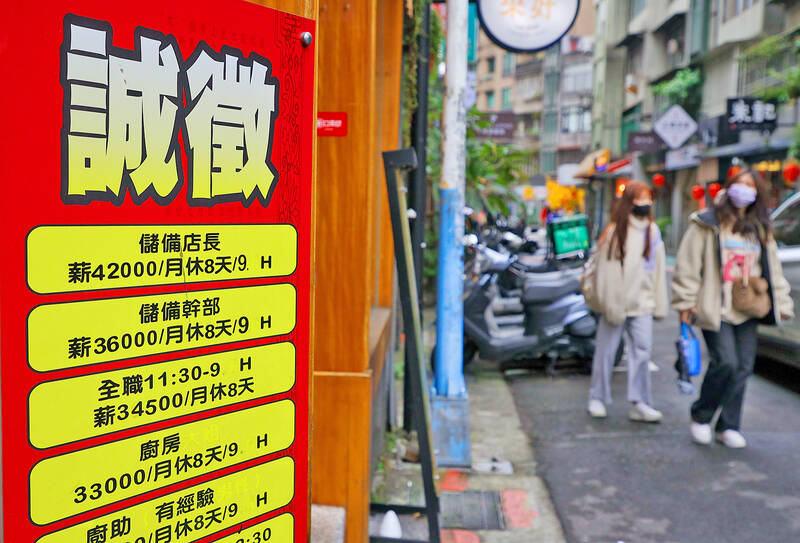The unemployment rate last month dropped a fractional 0.09 percentage points to 3.52 percent, as fewer people quit or lost their jobs due to business downsizing or closures, the Directorate-General of Budget, Accounting and Statistics (DGBAS) said yesterday.
The jobless rate was the lowest December figure in 22 years, thanks mainly to a fast recovery in private consumption after the government eased border controls and other COVID-19 restrictions.
The rate after seasonal adjustments shed 0.03 percentage points to 3.61 percent, signaling a stable job market, DGBAS Census Department Deputy Director Chen Hui-hsin (陳惠欣) said.

Photo: CNA
Chen said that 418,000 people were registered as unemployed, a 2.34 percent drop from November, as the number of people who lost their jobs due to business downsizing and closures fell by 4,000, while the number of people who quit fell by 2,000.
The average unemployment period excluding the 7,000 people who had been jobless for more than a year increased by 0.7 weeks to 22.4 weeks, the agency said.
For the whole of last year, the unemployment rate fell 0.28 percentage points to 3.67 percent, also the lowest in 22 years, Chen said.
Last month, people with university degrees had the highest jobless rate of 5.24 percent, followed by people with high-school degrees at 3.34 percent, people with graduate degrees at 2.77 percent and people with junior-high school degrees at 2.36 percent, the agency said.
By demographic breakdown, people aged 20 to 24 had the highest unemployment rate of 12.36 percent, followed by the 15-to-19 age bracket at 8.72 percent, the 25-to-29 bracket at 6.13 percent and the 30-to-34 bracket at 3.7 percent, it said.
People aged 45 or older had the lowest jobless rate of 2.26 percent, it added.
Meanwhile, people’s confidence in the economy and stock market this month continued to retreat amid ongoing macroeconomic headwinds and geopolitical concerns, a Cathay Financial Holding Co (國泰金控) survey released yesterday showed.
About 45 percent of 19,962 people surveyed expected the TAIEX to fall below 12,000 points in the first half of this year, and 20 percent forecast a dip to between 12,000 and 13,000 points, while 35 percent said the index would not fall below 13,000 points, the survey showed.
While expectations diverged on the TAIEX’s peak this year, respondents were generally much more pessimistic about Taiwanese equities than a month earlier, the survey showed.
People also turned more conservative about economic growth this year, with about 52 percent of respondents saying the economy would worsen over the next six months and only 23 percent expecting improvement.
Respondents expected an annual GDP growth of 2.2 percent this year, lower than the 2.75 percent DGBAS estimate, Cathay Financial said.
While the DGBAS estimated that inflation would ease to 1.86 percent this year, Cathay Financial’s survey showed that people expected inflation of about 2.3 percent.
With dampening sentiment toward the economy, the index assessing big-ticket spending willingness fell to minus-2.5 from 9.5 a month earlier, and the index gauging plans to buy homes fell from minus-53.6 to minus-58, the survey found.
The survey was conducted online from Jan. 1 to 7 among clients of Cathay Financial subsidiaries Cathay Life Insurance Co (國泰人壽) and Cathay United Bank (國泰世華銀行).

Real estate agent and property developer JSL Construction & Development Co (愛山林) led the average compensation rankings among companies listed on the Taiwan Stock Exchange (TWSE) last year, while contract chipmaker Taiwan Semiconductor Manufacturing Co (TSMC, 台積電) finished 14th. JSL Construction paid its employees total average compensation of NT$4.78 million (US$159,701), down 13.5 percent from a year earlier, but still ahead of the most profitable listed tech giants, including TSMC, TWSE data showed. Last year, the average compensation (which includes salary, overtime, bonuses and allowances) paid by TSMC rose 21.6 percent to reach about NT$3.33 million, lifting its ranking by 10 notches

Popular vape brands such as Geek Bar might get more expensive in the US — if you can find them at all. Shipments of vapes from China to the US ground to a near halt last month from a year ago, official data showed, hit by US President Donald Trump’s tariffs and a crackdown on unauthorized e-cigarettes in the world’s biggest market for smoking alternatives. That includes Geek Bar, a brand of flavored vapes that is not authorized to sell in the US, but which had been widely available due to porous import controls. One retailer, who asked not to be named, because

SEASONAL WEAKNESS: The combined revenue of the top 10 foundries fell 5.4%, but rush orders and China’s subsidies partially offset slowing demand Taiwan Semiconductor Manufacturing Co (TSMC, 台積電) further solidified its dominance in the global wafer foundry business in the first quarter of this year, remaining far ahead of its closest rival, Samsung Electronics Co, TrendForce Corp (集邦科技) said yesterday. TSMC posted US$25.52 billion in sales in the January-to-March period, down 5 percent from the previous quarter, but its market share rose from 67.1 percent the previous quarter to 67.6 percent, TrendForce said in a report. While smartphone-related wafer shipments declined in the first quarter due to seasonal factors, solid demand for artificial intelligence (AI) and high-performance computing (HPC) devices and urgent TV-related orders

MINERAL DIPLOMACY: The Chinese commerce ministry said it approved applications for the export of rare earths in a move that could help ease US-China trade tensions Chinese Vice Premier He Lifeng (何立峰) is today to meet a US delegation for talks in the UK, Beijing announced on Saturday amid a fragile truce in the trade dispute between the two powers. He is to visit the UK from yesterday to Friday at the invitation of the British government, the Chinese Ministry of Foreign Affairs said in a statement. He and US representatives are to cochair the first meeting of the US-China economic and trade consultation mechanism, it said. US President Donald Trump on Friday announced that a new round of trade talks with China would start in London beginning today,